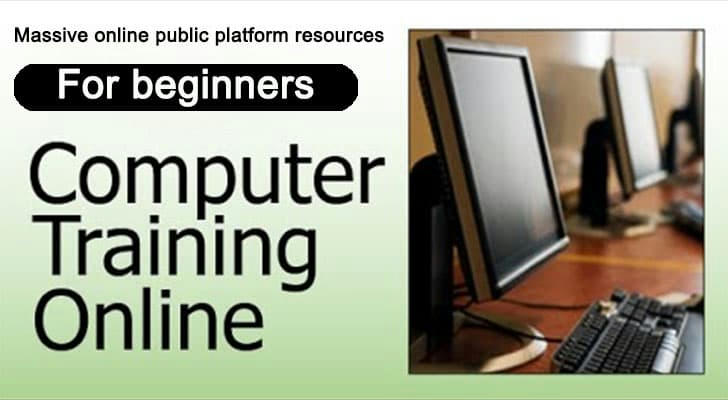2025 Online Computer Course Guide For Beginners Without Tuition Concerns
(Basic Courses, Programming, Software Development, Network Technology, Artificial Intelligence, and More )
Looking to improve your tech skills without worrying about tuition? Today’s digital learning platforms make it easy to enroll in online computer courses designed for learners seeking affordable, flexible options. Whether your goal is to build software skills, gain IT knowledge, or explore data science fundamentals, this guide provides step-by-step instructions and trusted resources to help you start your learning journey.

Why Consider an Online Computer Course?
As digital skills become increasingly essential, taking an online computer course is a smart way to enhance your career or explore new tech fields. These programs offer flexibility and accessibility—ideal for:
● Individuals exploring careers in IT or software development
● Jobseekers enhancing their digital skillset
● Students and adults learning computing basics or specialized tools
1. Identify Your Learning Goals
Start by identifying what you want to achieve. Different online courses offer different outcomes:
● For coding skills: Look for programming or development courses
● For IT support: Consider introductory tech and networking content
● For general digital literacy: Choose basic computer operation courses
2. Explore Platforms Offering available publicly online or Low-Cost Learning Options
Several platforms allow you to take online computer courses without upfront payments. You can learn key topics, with optional fees only if you want a certificate or extra features.
Top platforms include:
● Coursera – Offers courses in computer science, IT support, and software development. Audit options are available.
● edX – Features academic-level courses in programming, cybersecurity, and more.
● Alison – Well-known for tech courses covering coding, cloud computing, and IT fundamentals.
● OpenLearn – Delivers practical computing skills and introductory tech training.

3. Evaluate Course Content and Relevance
Make sure the online computer course you choose is aligned with your goals and includes useful, hands-on content.
Topics to look for:
● Coding languages (Python, JavaScript, HTML)
● Networking and IT basics
● Cloud services and cybersecurity
● Digital tools and software applications
Checklist:
● Is the course beginner-friendly or advanced?
● Does it include practical exercises or projects?
● Is it developed by a reputable institution or provider?
4. Enroll and Start Learning
Once you select the right course, enroll through your preferred platform. Many online computer courses begin immediately or offer flexible start dates.
Enrollment steps:
● Register on Coursera, edX, Alison, or OpenLearn
● Search for topics like “computer skills,” “coding,” or “IT basics”
● Select options labeled “audit available” or “start now”
● Begin learning without tuition concerns
5. Plan Your Study Schedule
Most online computer courses are self-paced. To stay on track:
● Set realistic weekly goals (e.g., one module per week)
● Schedule consistent study time
● Use online forums or study groups for support
6. Complete Assignments and Track Your Progress
Online courses typically include videos, quizzes, and hands-on tasks. To complete a course successfully:
● Finish all required content
● Pass quizzes or assignments
● Reach the minimum passing score (often 80%)
Some platforms offer proof of completion, while official certificates may require a small fee.
7. Build Toward More Advanced Learning
After finishing one online computer course, you can stack learning by continuing with:
● Specialized tech tracks (e.g., data analytics, web development)
● Micro-credentials that lead to professional qualifications
● University-level course series or diplomas
8. Stay Connected and Updated
To keep learning relevant and current:
● Subscribe to tech newsletters and coding blogs
● Join programming communities or discussion groups
● Follow industry trends on platforms like GitHub or LinkedIn
9. Use Your Skills Strategically
After completing an online computer course, apply your new knowledge professionally:
● Update your résumé and online profiles
● Apply for entry-level tech jobs, internships, or freelance roles
● Use the course as a stepping stone to more advanced education or certifications
10. Common Questions About Online Computer Courses
Are online computer courses helpful for getting a job?
Yes. Employers often value practical tech skills, especially when backed by training from recognized platforms.
What’s the difference between a course and a certificate program?
A course teaches a specific skill or topic. A certificate program may combine several courses into a structured path.
Do I have to pay for certificates?
Most courses are available publicly online, but a fee may apply if you want an official certificate—though many platforms offer financial aid.
Conclusion
Completing an online computer course—without worrying about tuition—can open doors to career opportunities, technical skills, and lifelong learning. Whether you're exploring IT for the first time or preparing for a role in tech, these online resources make it possible to grow at your own pace, affordably and effectively.
The information on this site is of a general nature only and is not intended to address the specific circumstances of any particular individual or entity. It is not intended or implied to be a substitute for professional advice. Read more.
Published on July 16, 2025
